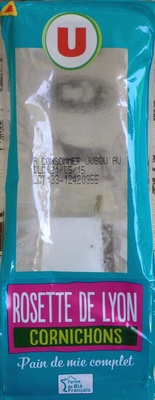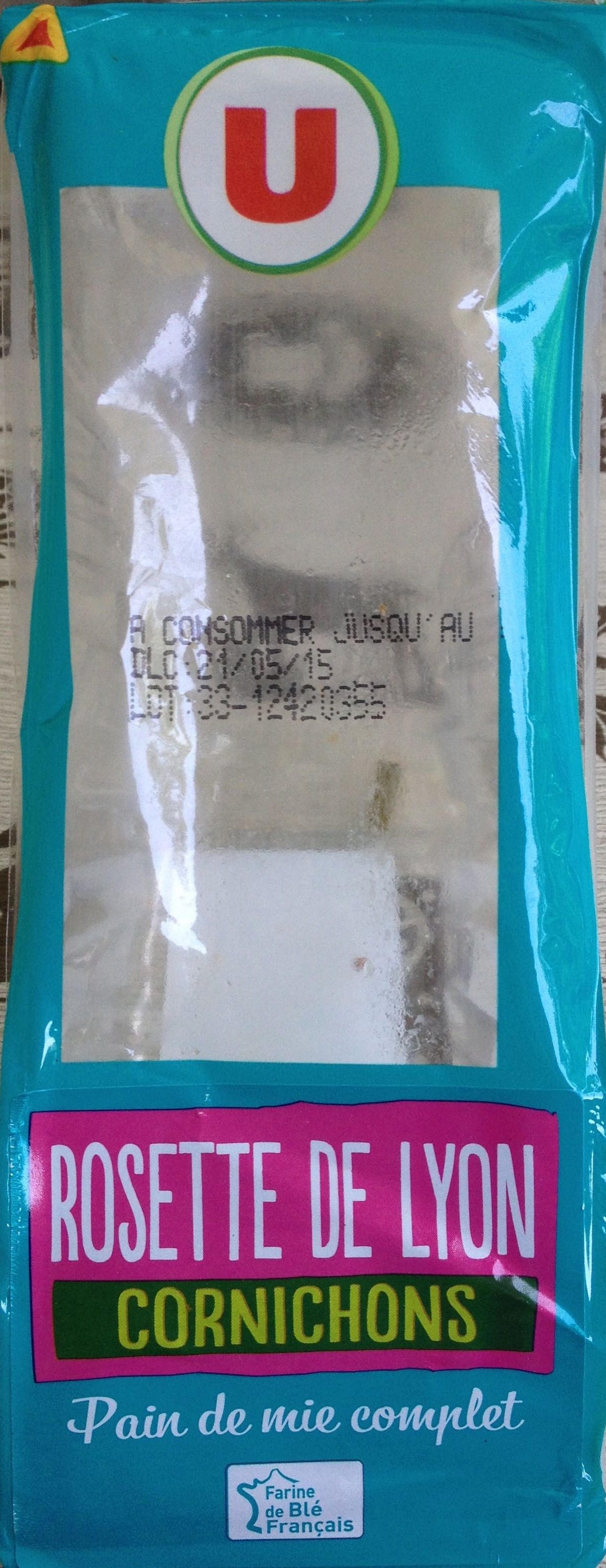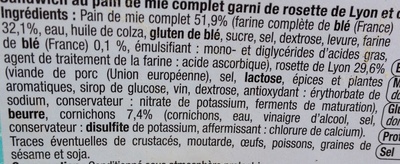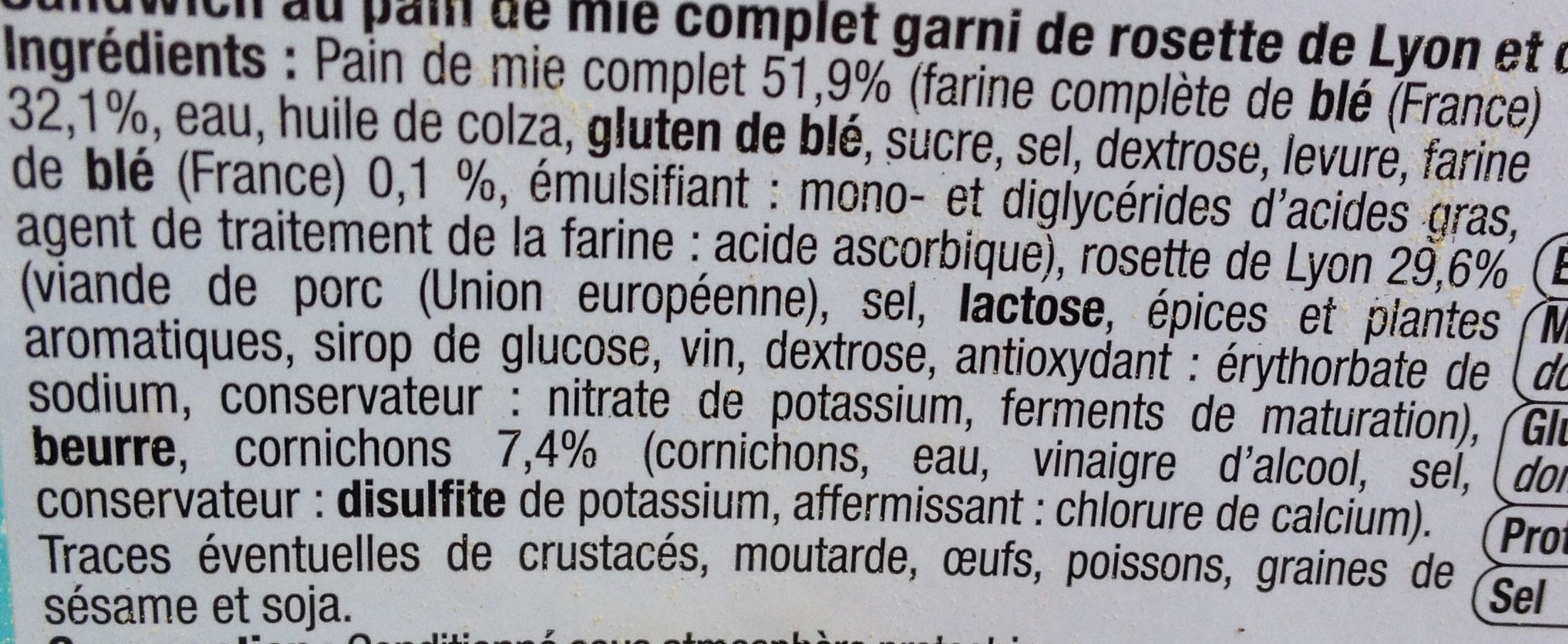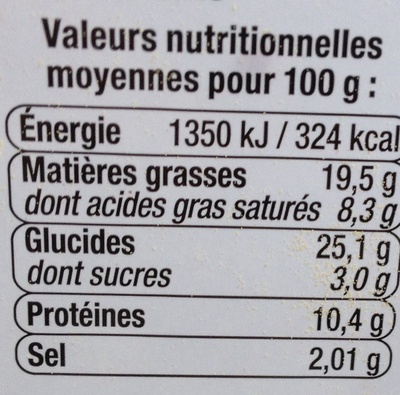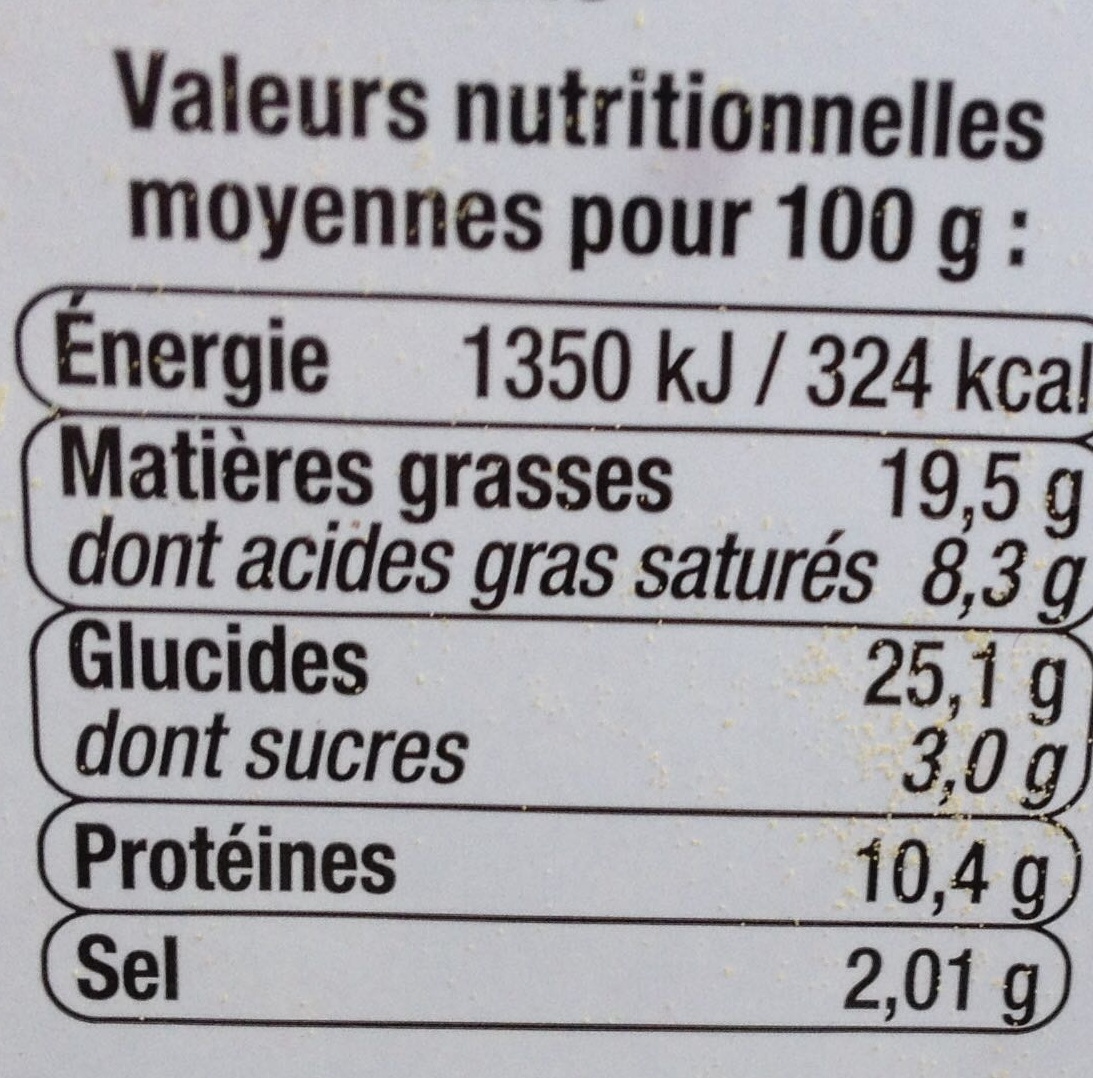Help us make food transparency the norm!
As a non-profit organization, we depend on your donations to continue informing consumers around the world about what they eat.
The food revolution starts with you!
Rosette de Lyon cornichons - U - 135 g
Rosette de Lyon cornichons - U - 135 g
This product page is not complete. You can help to complete it by editing it and adding more data from the photos we have, or by taking more photos using the app for Android or iPhone/iPad. Thank you!
×
Barcode: 3256224716235 (EAN / EAN-13)
Common name: Sandwich au pain de mie complet garni de rosette de Lyon et de cornichons
Quantity: 135 g
Brands: U
Categories: Sandwiches, Sandwiches filled with cold cuts, Rosette Sandwiches
Labels, certifications, awards: fr:Farine de blé français
Stores: Magasins U
Countries where sold: France
Matching with your preferences
Health
Ingredients
-
37 ingredients
French: Pain de mie complet 51.9% (farine complète de blé (France) 32.1%, eau, huile de colza, gluten de blé, sucre, sel, dextrose, levure, farine de blé (France) 0.1%, émulsifiant : mono - et diglycérides d'acides gras, agent de traitement de la farine : acide ascorbique), rosette de Lyon 29.6% (viande de porc Union Européenne), sel, lactose, épices et plantes aromatiques, sirop de glucose, vin, dextrose, antioxydant : érythorbate de sodium, conservateur : nitrate de potassium, ferments de maturation), beurre, cornichons 7.4% (cornichons, eau, vinaigre d'alcool, sel, conservateur : disulfite de potassium, affermissant : chlorure de calcium).Allergens: Gluten, Milk, Sulphur dioxide and sulphitesTraces: Crustaceans, Eggs, Fish, Mustard, Sesame seeds, Soybeans
Food processing
-
Ultra processed foods
Elements that indicate the product is in the 4 - Ultra processed food and drink products group:
- Additive: E471 - Mono- and diglycerides of fatty acids
- Ingredient: Dextrose
- Ingredient: Emulsifier
- Ingredient: Firming agent
- Ingredient: Glucose
- Ingredient: Glucose syrup
- Ingredient: Gluten
- Ingredient: Lactose
Food products are classified into 4 groups according to their degree of processing:
- Unprocessed or minimally processed foods
- Processed culinary ingredients
- Processed foods
- Ultra processed foods
The determination of the group is based on the category of the product and on the ingredients it contains.
Additives
-
E224 - Potassium metabisulphite
Potassium metabisulfite: Potassium metabisulfite, K2S2O5, also known as potassium pyrosulfite, is a white crystalline powder with a pungent sulfur odour. The main use for the chemical is as an antioxidant or chemical sterilant. It is a disulfite and is chemically very similar to sodium metabisulfite, with which it is sometimes used interchangeably. Potassium metabisulfite is generally preferred out of the two as it does not contribute sodium to the diet. Potassium metabisulfite has a monoclinic crystal structure which decomposes at 190 °C, yielding potassium sulfite and sulfur dioxide: K2S2O5-s- → K2SO3-s- + SO2-g-Source: Wikipedia
-
E252 - Potassium nitrate
Potassium nitrate: Potassium nitrate is a chemical compound with the chemical formula KNO3. It is an ionic salt of potassium ions K+ and nitrate ions NO3−, and is therefore an alkali metal nitrate. It occurs in nature as a mineral, niter. It is a source of nitrogen, from which it derives its name. Potassium nitrate is one of several nitrogen-containing compounds collectively referred to as saltpeter or saltpetre. Major uses of potassium nitrate are in fertilizers, tree stump removal, rocket propellants and fireworks. It is one of the major constituents of gunpowder -black powder- and has been used since the Middle Ages as a food preservative.Source: Wikipedia
-
E316 - Sodium erythorbate
Sodium erythorbate: Sodium erythorbate -C6H7NaO6- is a food additive used predominantly in meats, poultry, and soft drinks. Chemically, it is the sodium salt of erythorbic acid. When used in processed meat such as hot dogs and beef sticks, it increases the rate at which nitrite reduces to nitric oxide, thus facilitating a faster cure and retaining the pink coloring. As an antioxidant structurally related to vitamin C, it helps improve flavor stability and prevents the formation of carcinogenic nitrosamines. When used as a food additive, its E number is E316. The use of erythorbic acid and sodium erythorbate as a food preservative has increased greatly since the U.S. Food and Drug Administration banned the use of sulfites as preservatives in foods intended to be eaten fresh -such as ingredients for fresh salads- and as food processors have responded to the fact that some people are allergic to sulfites. It can also be found in bologna, and is occasionally used in beverages, baked goods, and potato salad.Sodium erythorbate is produced from sugars derived from different sources, such as beets, sugar cane, and corn. An urban myth claims that sodium erythorbate is made from ground earthworms; however, there is no truth to the myth. It is thought that the genesis of the legend comes from the similarity of the chemical name to the words earthworm and bait.Alternative applications include the development of additives that could be utilized as anti-oxidants in general. For instance, this substance has been implemented in the development of corrosion inhibitors for metals and it has been implemented in active packaging.Sodium erythorbate is soluble in water. The pH of the aqueous solution of the sodium salt is between 5 and 6. A 10% solution, made from commercial grade sodium erythorbate, may have a pH of 7.2 to 7.9. In its dry, crystalline state it is nonreactive. But, when in solution with water it readily reacts with atmospheric oxygen and other oxidizing agents, which makes it a valuable antioxidant.Source: Wikipedia
-
E471 - Mono- and diglycerides of fatty acids
Mono- and diglycerides of fatty acids (E471), are food additives commonly used as emulsifiers in various processed foods.
These compounds consist of glycerol molecules linked to one or two fatty acid chains, which help stabilize and blend water and oil-based ingredients. E471 enhances the texture and shelf life of products like margarine, baked goods, and ice cream, ensuring a smooth and consistent texture.
It is generally considered safe for consumption within established regulatory limits.
-
E509 - Calcium chloride
Calcium chloride: Calcium chloride is an inorganic compound, a salt with the chemical formula CaCl2. It is a colorless crystalline solid at room temperature, highly soluble in water. Calcium chloride is commonly encountered as a hydrated solid with generic formula CaCl2-H2O-x, where x = 0, 1, 2, 4, and 6. These compounds are mainly used for de-icing and dust control. Because the anhydrous salt is hygroscopic, it is used as a desiccant.Source: Wikipedia
Ingredients analysis
-
May contain palm oil
Ingredients that may contain palm oil: E471
-
Non-vegan
Non-vegan ingredients: Lactose, ButterSome ingredients could not be recognized.
We need your help!
You can help us recognize more ingredients and better analyze the list of ingredients for this product and others:
- Edit this product page to correct spelling mistakes in the ingredients list, and/or to remove ingredients in other languages and sentences that are not related to the ingredients.
- Add new entries, synonyms or translations to our multilingual lists of ingredients, ingredient processing methods, and labels.
If you would like to help, join the #ingredients channel on our Slack discussion space and/or learn about ingredients analysis on our wiki. Thank you!
-
Vegetarian status unknown
Unrecognized ingredients: fr:Pain de mie complet, fr:rosette-de-lyon, fr:viande-de-porc-union-europeenneSome ingredients could not be recognized.
We need your help!
You can help us recognize more ingredients and better analyze the list of ingredients for this product and others:
- Edit this product page to correct spelling mistakes in the ingredients list, and/or to remove ingredients in other languages and sentences that are not related to the ingredients.
- Add new entries, synonyms or translations to our multilingual lists of ingredients, ingredient processing methods, and labels.
If you would like to help, join the #ingredients channel on our Slack discussion space and/or learn about ingredients analysis on our wiki. Thank you!
-
Details of the analysis of the ingredients
We need your help!
Some ingredients could not be recognized.
We need your help!
You can help us recognize more ingredients and better analyze the list of ingredients for this product and others:
- Edit this product page to correct spelling mistakes in the ingredients list, and/or to remove ingredients in other languages and sentences that are not related to the ingredients.
- Add new entries, synonyms or translations to our multilingual lists of ingredients, ingredient processing methods, and labels.
If you would like to help, join the #ingredients channel on our Slack discussion space and/or learn about ingredients analysis on our wiki. Thank you!
fr: Pain de mie complet 51.9% (farine complète de _blé_ 32.1%, eau, huile de colza, _gluten de blé_, sucre, sel, dextrose, levure, farine de _blé_ 0.1%, émulsifiant (mono- et diglycérides d'acides gras), agent de traitement de la farine (acide ascorbique)), rosette de Lyon 29.6% (viande de porc Union Européenne), sel, _lactose_, épices et plantes aromatiques, sirop de glucose, vin, dextrose, antioxydant (érythorbate de sodium), conservateur (nitrate de potassium), ferments de maturation, _beurre_, cornichons 7.4% (cornichons, eau, vinaigre d'alcool, sel, conservateur (_disulfite_ de potassium), affermissant (chlorure de calcium))- Pain de mie complet -> fr:pain-de-mie-complet - percent: 51.9
- farine complète de _blé_ -> en:whole-wheat-flour - vegan: yes - vegetarian: yes - ciqual_proxy_food_code: 9410 - percent: 32.1
- eau -> en:water - vegan: yes - vegetarian: yes - ciqual_food_code: 18066
- huile de colza -> en:colza-oil - vegan: yes - vegetarian: yes - from_palm_oil: no - ciqual_food_code: 17130
- _gluten de blé_ -> en:wheat-gluten - vegan: yes - vegetarian: yes
- sucre -> en:sugar - vegan: yes - vegetarian: yes - ciqual_proxy_food_code: 31016
- sel -> en:salt - vegan: yes - vegetarian: yes - ciqual_food_code: 11058
- dextrose -> en:dextrose - vegan: yes - vegetarian: yes - ciqual_proxy_food_code: 31016
- levure -> en:yeast - vegan: yes - vegetarian: yes
- farine de _blé_ -> en:wheat-flour - vegan: yes - vegetarian: yes - ciqual_proxy_food_code: 9410 - percent: 0.1
- émulsifiant -> en:emulsifier
- mono- et diglycérides d'acides gras -> en:e471 - vegan: maybe - vegetarian: maybe - from_palm_oil: maybe
- agent de traitement de la farine -> en:flour-treatment-agent
- acide ascorbique -> en:e300 - vegan: yes - vegetarian: yes
- rosette de Lyon -> fr:rosette-de-lyon - percent: 29.6
- viande de porc Union Européenne -> fr:viande-de-porc-union-europeenne
- sel -> en:salt - vegan: yes - vegetarian: yes - ciqual_food_code: 11058
- _lactose_ -> en:lactose - vegan: no - vegetarian: yes
- épices et plantes aromatiques -> en:herbs-and-spices - vegan: yes - vegetarian: yes
- sirop de glucose -> en:glucose-syrup - vegan: yes - vegetarian: yes - ciqual_proxy_food_code: 31016
- vin -> en:wine - vegan: maybe - vegetarian: yes - ciqual_food_code: 1014
- dextrose -> en:dextrose - vegan: yes - vegetarian: yes - ciqual_proxy_food_code: 31016
- antioxydant -> en:antioxidant
- érythorbate de sodium -> en:e316 - vegan: yes - vegetarian: yes
- conservateur -> en:preservative
- nitrate de potassium -> en:e252 - vegan: yes - vegetarian: yes
- ferments de maturation -> fr:ferments-de-maturation - vegan: maybe - vegetarian: maybe
- _beurre_ -> en:butter - vegan: no - vegetarian: yes - ciqual_proxy_food_code: 16400
- cornichons -> en:gherkin - vegan: yes - vegetarian: yes - ciqual_proxy_food_code: 11004 - percent: 7.4
- cornichons -> en:gherkin - vegan: yes - vegetarian: yes - ciqual_proxy_food_code: 11004
- eau -> en:water - vegan: yes - vegetarian: yes - ciqual_food_code: 18066
- vinaigre d'alcool -> en:alcohol-vinegar - vegan: yes - vegetarian: yes - ciqual_food_code: 11018
- sel -> en:salt - vegan: yes - vegetarian: yes - ciqual_food_code: 11058
- conservateur -> en:preservative
- _disulfite_ de potassium -> en:e224 - vegan: yes - vegetarian: yes
- affermissant -> en:firming-agent
- chlorure de calcium -> en:e509 - vegan: yes - vegetarian: yes
en:wheat-flour -> en:wheat-flour
Nutrition
-
Bad nutritional quality
⚠ ️Warning: the amount of fiber is not specified, their possible positive contribution to the grade could not be taken into account.⚠ ️Warning: the amount of fruits, vegetables and nuts is not specified on the label, it was estimated from the list of ingredients: 12This product is not considered a beverage for the calculation of the Nutri-Score.
Positive points: 0
- Proteins: 5 / 5 (value: 10.4, rounded value: 10.4)
- Fiber: 0 / 5 (value: 0, rounded value: 0)
- Fruits, vegetables, nuts, and colza/walnut/olive oils: 0 / 5 (value: 12.35, rounded value: 12.4)
Negative points: 20
- Energy: 4 / 10 (value: 1350, rounded value: 1350)
- Sugars: 0 / 10 (value: 3, rounded value: 3)
- Saturated fat: 8 / 10 (value: 8.3, rounded value: 8.3)
- Sodium: 8 / 10 (value: 804, rounded value: 804)
The points for proteins are not counted because the negative points are greater or equal to 11.
Nutritional score: (20 - 0)
Nutri-Score:
-
Nutrient levels
-
Fat in moderate quantity (19.5%)
What you need to know- A high consumption of fat, especially saturated fats, can raise cholesterol, which increases the risk of heart diseases.
Recommendation: Limit the consumption of fat and saturated fat- Choose products with lower fat and saturated fat content.
-
Saturated fat in high quantity (8.3%)
What you need to know- A high consumption of fat, especially saturated fats, can raise cholesterol, which increases the risk of heart diseases.
Recommendation: Limit the consumption of fat and saturated fat- Choose products with lower fat and saturated fat content.
-
Sugars in low quantity (3%)
What you need to know- A high consumption of sugar can cause weight gain and tooth decay. It also augments the risk of type 2 diabetes and cardio-vascular diseases.
Recommendation: Limit the consumption of sugar and sugary drinks- Sugary drinks (such as sodas, fruit beverages, and fruit juices and nectars) should be limited as much as possible (no more than 1 glass a day).
- Choose products with lower sugar content and reduce the consumption of products with added sugars.
-
Salt in high quantity (2.01%)
What you need to know- A high consumption of salt (or sodium) can cause raised blood pressure, which can increase the risk of heart disease and stroke.
- Many people who have high blood pressure do not know it, as there are often no symptoms.
- Most people consume too much salt (on average 9 to 12 grams per day), around twice the recommended maximum level of intake.
Recommendation: Limit the consumption of salt and salted food- Reduce the quantity of salt used when cooking, and don't salt again at the table.
- Limit the consumption of salty snacks and choose products with lower salt content.
-
-
Nutrition facts
Nutrition facts As sold
for 100 g / 100 mlAs sold
per serving (135 g)Compared to: Rosette Sandwiches Energy 1,350 kj
(323 kcal)1,820 kj
(435 kcal)+5% Fat 19.5 g 26.3 g +21% Saturated fat 8.3 g 11.2 g +19% Carbohydrates 25.1 g 33.9 g -11% Sugars 3 g 4.05 g +18% Fiber ? ? Proteins 10.4 g 14 g -8% Salt 2.01 g 2.71 g - Fruits‚ vegetables‚ nuts and rapeseed‚ walnut and olive oils (estimate from ingredients list analysis) 12.35 % 12.35 %
Environment
-
Eco-Score C - Moderate environmental impact
⚠ ️Select a country in order to include the full impact of transportation.The Eco-Score is an experimental score that summarizes the environmental impacts of food products.→ The Eco-Score was initially developped for France and it is being extended to other European countries. The Eco-Score formula is subject to change as it is regularly improved to make it more precise and better suited to each country.Life cycle analysis
-
Average impact of products of the same category: C (Score: 58/100)
Category: Sandwich made with French bread, dry sausage and butter
Category: Sandwich made with French bread, dry sausage and butter
- PEF environmental score: 0.45 (the lower the score, the lower the impact)
- including impact on climate change: 3.47 kg CO2 eq/kg of product
Stage Impact Agriculture
72.0 %Processing
16.8 %Packaging
5.1 %Transportation
3.5 %Distribution
2.0 %Consumption
0.5 %
Bonuses and maluses
-
Origins of ingredients with a high impact
Malus: -2
Environmental policy: -2
Transportation: 0
Origin of the product and/or its ingredients % of ingredients Impact Unknown 68 %High France 32 %Medium
-
Packaging with a medium impact
Malus: -10
Shape Material Recycling Impact Unknown Plastic High ⚠ ️ The information about the packaging of this product is not sufficiently precise (exact shapes and materials of all components of the packaging).⚠ ️ For a more precise calculation of the Eco-Score, you can modify the product page and add them.
If you are the manufacturer of this product, you can send us the information with our free platform for producers.
Eco-Score for this product
-
Impact for this product: C (Score: 46/100)
Product: Rosette de Lyon cornichons - U - 135 g
Life cycle analysis score: 58
Sum of bonuses and maluses: -12
Final score: 46/100
-
Carbon footprint
-
Equal to driving 1.8 km in a petrol car
347 g CO² per 100g of product
The carbon emission figure comes from ADEME's Agribalyse database, for the category: Sandwich made with French bread, dry sausage and butter (Source: ADEME Agribalyse Database)
Stage Impact Agriculture
74.3 %Processing
10.7 %Packaging
8.0 %Transportation
5.8 %Distribution
1.1 %Consumption
0.2 %
Packaging
-
Packaging with a medium impact
-
Packaging parts
(Plastic)
-
Packaging materials
Material % Packaging weight Packaging weight per 100 g of product Plastic
-
Transportation
-
Origins of ingredients
Origins of ingredients with a high impact
Origin of the product and/or its ingredients % of ingredients Impact Unknown 68 %High France 32 %Medium
Report a problem
-
Incomplete or incorrect information?
Category, labels, ingredients, allergens, nutritional information, photos etc.
If the information does not match the information on the packaging, please complete or correct it. Open Food Facts is a collaborative database, and every contribution is useful for all.
